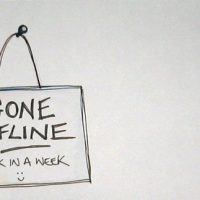What would it be like to go without mobile phones, computers and the internet for a day? A lot of people wouldn’t really know how to answer that question any more: for so long now we’ve been using all the conveniences of the digital world, offered to us by the simplifying algorithms of quoted American companies, and we’ve become so used to them. Our smartphones and laptops aren’t just devices any more, they’ve become an extension of ourselves.
But I do it two days a month: not using the internet at all, and using computers as little as possible. I can’t go without that any more.
This desire for unconnectedness has gradually grown in me during long flights to Australia, but also during the time when my mobile phone was broken while I was in Dubai and I couldn’t immediately have it repaired. Considering the megalomaniacal rates our telecommunications providers charge for using their services outside the country, it’s not really worthwhile anyway to be online from the other side of the world.
No notifications, no texts, no missed calls followed by texts and emails if you don’t call back soon. No reading or writing emails, no breaking news, no “hi how are you” Whatsapp messages or “what are you doing tonight” instant messaging. Am I missing anything? How would my grandma be doing? How am I going to structure my thoughts now, without a mobile keyboard? Writing with a pen is actually pretty tedious. How do I make sure I don’t lose this piece of paper? Stress, anxiety. Stop!
This is freedom. Peace and quiet. Nobody around. Space. We’ve forgotten what it’s like to be alone. To be truly alone. Alone with your thoughts. I had one idea after another. I thought of a new slide that I could use in my presentations, and of innovative concepts and solutions for clients.
In 2013, the online banking service of the Dutch bank ING was unavailable due to DDoS attacks. Other technology and innovation experts were lining up at the ING headquarters to sell their expensive solutions, but during one of my offline days I came up with a simple solution that barely cost ING anything at all. Soon their online banking service was up and running again for most people.
An offline day like this can be a real roller coaster of peace, creativity and ideas. It’s a day for independent thinking again, without the stimuli of constant push notifications and the need to check your inbox. And the next morning isn’t nearly as bad as you’d think: in fifteen or at most thirty minutes, you’ll have read everything you missed and you’ll have made a good proportion of the people who missed you happy again with your replies. So being offline for a day actually makes the next morning much more productive too.
Of course you might feel tempted now to list all the advantages of modern technology. I’ll be the first to confirm each and every one of them. But aren’t we taking things too far? Haven’t we secretly become dependent on and addicted to digital media and things with screens, filling up and simultaneously constraining our consciousness? How many of our thoughts are being directed by the algorithms of online corporations that decide for us what we get to see of and read about the world?
It’s a good idea to be all by yourself once in a while. Away from your thousands of Facebook friends and the billions of pages indexed by Google, away from the low-effort texts and messages from people who want something from you, away from all those push notifications, demanding your attention with chimes and flashing lights. No internet for one or two days a month.
I do it every month now. They’re my favourite days of the month. I try to encourage my staff, clients and suppliers to occasionally take a digital hiatus too. To let them do what they want to do, think what they want to think, and do the things they normally wouldn’t get around to doing, or don’t take enough time for. Would you dare to turn off your phone and laptop for a day?

Leave a Reply